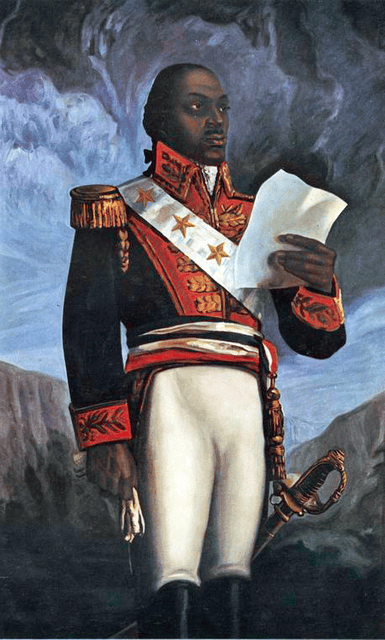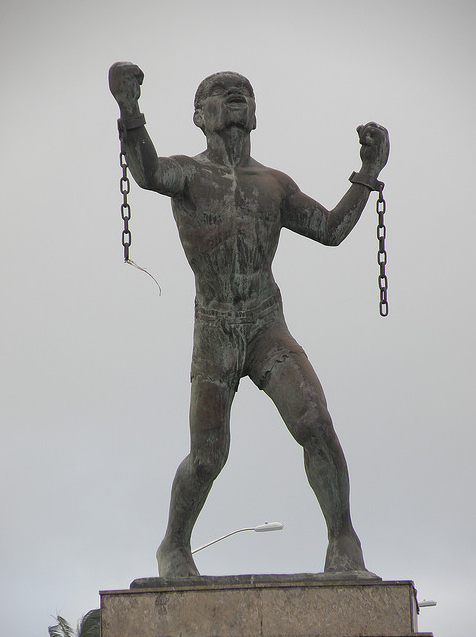Bussa's rebellion

Bussa's rebellion

| North American slave revolts |
|---|
This box: |
![Sketch of a flag used by the Bussa rebels including the slogan "Happiness Remains for Ever with endavoerance... Britannia are happy to lead any such Sons as endavwrance and God Always saves endavour" [sic]](https://everipedia.org/cdn-cgi/image/width=640/https://upload.wikimedia.org/wikipedia/commons/6/6d/God_always_saves_endavour.jpg)
Sketch of a flag used by the Bussa rebels including the slogan "Happiness Remains for Ever with endavoerance... Britannia are happy to lead any such Sons as endavwrance and God Always saves endavour" [sic]
Bussa's rebellion (14–16 April 1816) was the largest slave revolt in Barbadian history. The rebellion takes its name from the African-born slave, Bussa, who led the rebellion which was defeated by British forces. Bussa's Rebellion was the first of three large-scale slave rebellions in the British West Indies that shook public faith in slavery in the years leading up to the abolition of slavery in the British Empire and emancipation of former slaves. It was followed by the large-scale rebellion in Demerara in 1823 and by an even larger rebellion in Jamaica in 1831–32. Collectively these are often referred to as the "late slave rebellions".
| North American slave revolts |
|---|
This box: |
Bussa
Bussa (/ˈbʌsə/) was born a free man in West Africa of possible Igbo descent[1] and was captured by African slave merchants, sold to the British, and transported to Barbados (where slavery had been legal since 1661) in the late 18th century as a slave. Not much is known about him and there are no records of him prior to this date. Since slave owners almost never bothered to keep detailed records about the lives of their slaves (who were considered property), virtually no biographical information about Bussa is available. Records show a slave named "Bussa" worked as a ranger on "Bayley's Plantation" in the parish of Saint Philip around the time of the rebellion. This privileged position would have given Bussa more freedom of movement than the average slave and would have made it easier for him to plan and coordinate the rebellion.
Revolt

Bussa Emancipation Statue (1985) in Bridgetown
The revolts arose at a time when the British Parliament was working on schemes to ameliorate the conditions of slaves in the Caribbean. Preparation for this rebellion began soon after the House of Assembly discussed and rejected the Imperial Registry Bill in November 1815, which would have registered colonial slaves. Historians believe that slaves interpreted some of the parliamentary proposals as preparatory to emancipation, and took action when freedom did not take place.[2]
Among Bussa's collaborators were Washington, Franklin, John and Nanny Grigg, a senior domestic slave, and Jackey on Simmons' Plantation, as well as other slaves, drivers and artisans. Jackey was a Creole driver who was an important figure. The planning was undertaken at a number of sugar estates, including Bailey's plantation, where it began. By February 1816, Bussa was an African driver, one of the few in his position.[2] He and his collaborators decided to start the revolt on 14 April, Easter Sunday.
Bussa, King Wiltshire, Dick Bailey, and Johnny led the slaves into battle at Bailey's Plantation on Tuesday, 16 April. He commanded some 400 freedom fighters, both men and women, most of whom were believed to be Creole, born in the islands. He was killed in battle. His forces continued the fight until they were defeated by superior firepower of the colonial militia. The rebellion failed but its influence was significant to the future of Barbados.
Legacy
Bussa remains a popular figure in Barbados
In 1985, 169 years after his rebellion, the Emancipation Statue, created by Karl Broodhagen, was unveiled in Haggatt Hall, in the parish of St Michael
1998, the Parliament named Bussa as one of the ten National Heroes of Barbados[3]